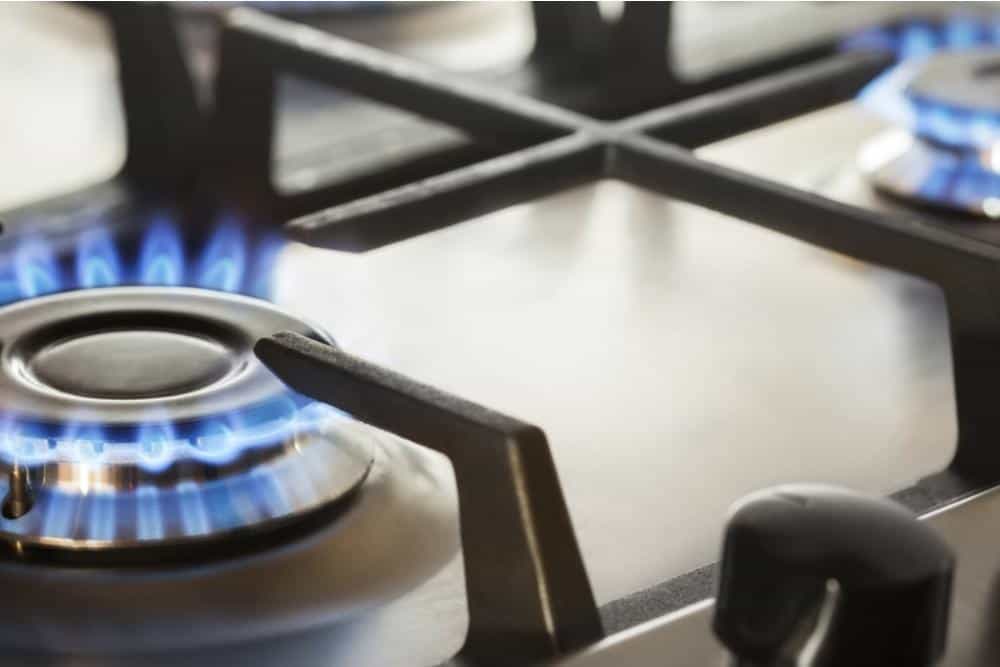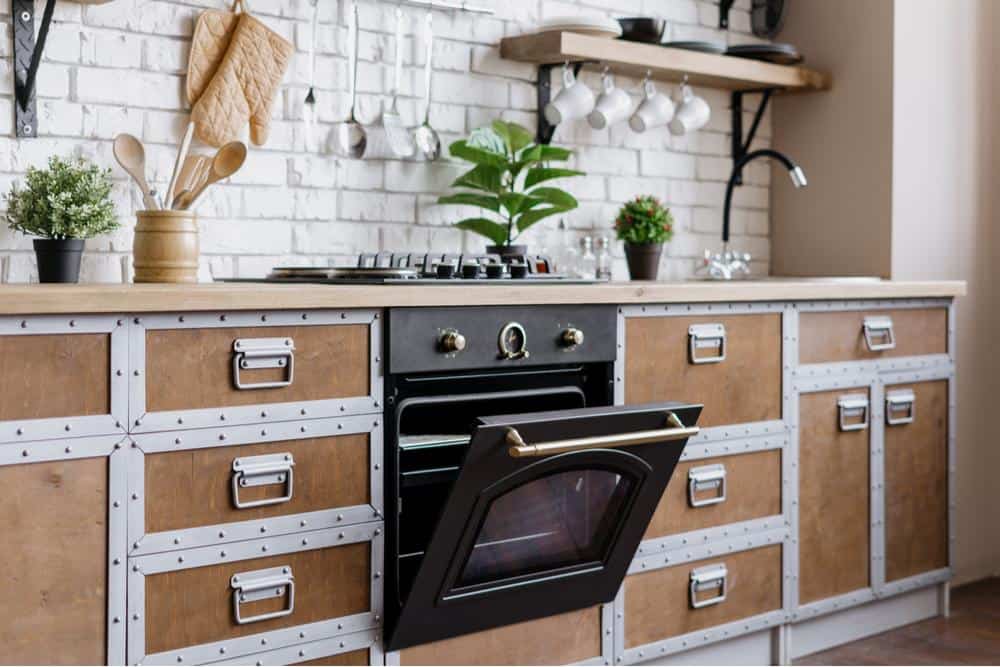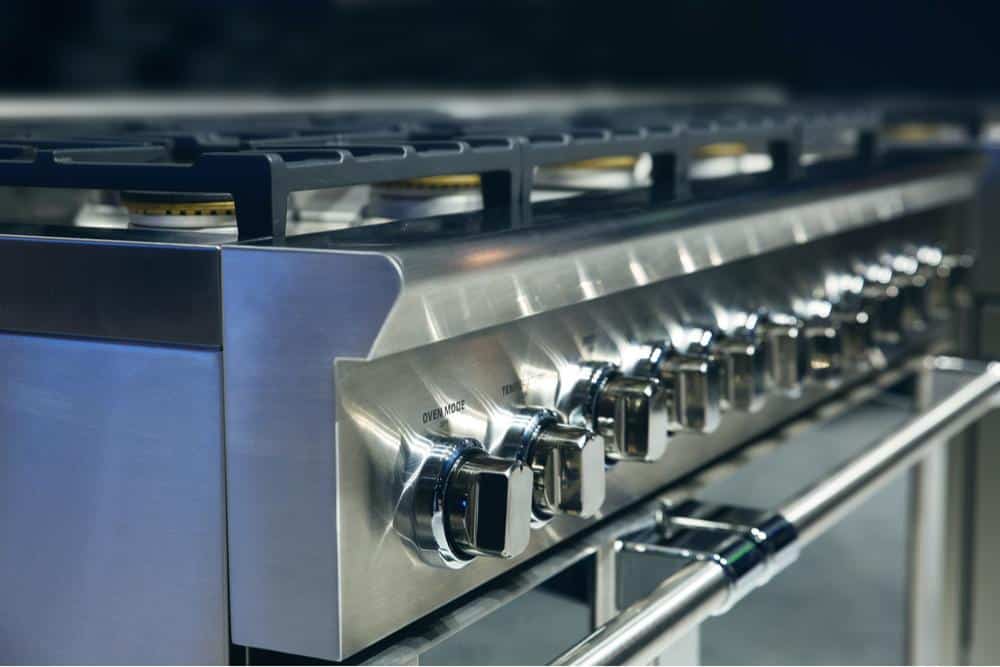Gas ovens can emit unknown noises. A diligent homeowner can take steps to figure out the cause of that gas oven sound and call in the right person to fix the problem.
Puffing, booming, blow torch, or fizzing, gas stoves seem to enjoy failing on us homeowners at the last minute.
In this article, I’ll break down everything you need to know about gas ovens or a gas range making a puffing noise. I’ll explain why it’s happening so you can better describe your issue to the person who will come in to fix the problem.
This article includes:
Appliances that burn natural gas inefficiently - like many gas ovens - can generate an unhealthy amount of carbon monoxide (CO). Carbon monoxide is a silent killer that you can't detect.
Make sure that you have carbon monoxide detectors installed in your home according to the detector specifications. Don't attempt to perform fixes on a gas appliance yourself.
Remember, no matter what you may see on the Internet, always be sure to check with a qualified gas stove repair company or a gas appliance pro instead of attempting repairs yourself.
Don’t take chances with gas appliances, call your appliance repair person
If your gas stove makes a puffing noise, the most common cause is a dirty igniter. However, two other things can be causing that noise to occur - the air shutter or the gas valve.
The igniter is where the flame originates from. The igniter lights the gas and allows the gas burner to provide heat to the oven. Ovens and stoves can get dirty quickly, as food leaks and oil splashes are somewhat inevitable. The greasy residue can cover the igniter, and so the flame will have to burn that residue clean before really igniting.
For your gas range, making sure that you keep your burner cap clean can help prevent this issue. Food and debris can coat the burner and cause these igniter issues.
Also accompanying this phenomenon is an accumulation of unburned gas. This results in a delayed ignition. When it does ignite, the oxygen intake can be sudden, which causes the puffing sound.
The location of the igniter differs, so you need to check the users’ manual for your model.
An air shutter determines how much oxygen mixes with the gas. These two combust to create the flame that charbroils your steak on your gas stove. The amount of air and gas necessary to combust will be determined by your stove's maker. 
Keeping your gas oven clean goes a long way towards preventing potential problems
When the flame is not getting an even flow of a sufficient amount of oxygen, it can make small puffing sounds. You will probably be able to hear them not only the moment you turn the oven on but also all the while it’s on.
Sometimes, the air shutter can be knocked out of place or improperly adjusted. Check to see the flame color on your gas stove. If it’s blue, you know the gas is combusting correctly, meaning it’s not the air shutter. If the flame is a yellow color, the gas doesn’t have enough air to properly combust. This means you must adjust the air shutter.
The gas valve controls the gas flow into your igniter. If your gas valve is faulty, it may send too much gas into the igniter. This also causes a puffing or popping sound.
Now that you understand what part of your stove needs fixing, it’s time to get around to remedying your situation. Keep in mind that when working with gas stoves, it’s always best to have a professional fix it for you, for your safety as well as those in your house.
When your gas appliance repair person cleans your igniter (or performs just about any action on your gast stove), they’ll make sure that the gas supply is turned off before doing any work. Of course, the oven itself should be off, and it should be cool.
First, it’s advisable to clean the whole oven, so you can ensure that debris or residues aren’t causing any problems. If your oven doesn’t have a self-cleaning feature, there are a few options you can choose from to remove the dirt.
The most common method involves using baking soda and vinegar; these substances are safe and won’t leave too much odor. You can also use a bit of warm water or oven-specific cleaning products. Be careful only to use products made especially for cleaning ovens and stoves, as others may be flammable or cause dangerous chemical reactions.
The appliance repair pro will clean the igniter itself with a toothbrush (or a specialized brush device). They’ll clean the hole from where the flame comes out, too.
Next, your appliance repair pro may adjust the air shutter. These shutters are often screwed in behind the burner valve. All it takes is loosening the screw and adjusting the air shutter back to its original correct placement.
Now, many DIY videos exist on YouTube showing people waving screwdrivers around and adjusting their air shutters themselves. While it’s supposed to be an easy fix on paper, in real life, it is not. Instead of a correct adjustment, you may accidentally make your problem worse by positioning the air shutter in another incorrect position.
So, as with all gas stove maintenance, this job is best performed by the appliance repair pro. Even if you do, consult with the owner’s manual. They’ll be able to test their work by turning the gas on and the oven back on when their work is completed.
Replacing a gas valve requires extensive knowledge of the specific make of the gas stove and the science behind it. Such a replacement also requires direct contact with the gas line, making this an extremely dangerous repair for anyone who isn't a professional.
Call a local gas stove mechanic or talk to your gas company to conduct the replacement. Failure to comply may result in a gas leak, which can lead to an explosion.
When it comes to fixing the puffing noise of a gas stove, it’s always best to contact a certified professional, preferably one who has experience with your specific gas stove make and model.
When it comes to replacing a gas valve, always contact a mechanic to replace it for you.
Always contact your local gas company to notify them of any sort of work you plan to do on a gas valve, even though you’re having a professional do the actual work. Informing the company can help mitigate the risk of a gas leak, which will likely affect your whole building or neighborhood.
Sometimes, things may go awry with fixing that puffing sound in your gas oven. Gas leaks can sometimes occur when the person replacing or adjusting the gas valve makes a mistake.
Smelling gas from your oven may represent a very serious problem. Natural gas itself is colorless and odorless, but a chemical called mercaptan is added to natural gas to help us easily identify through smell when there may be gas leak.
When a gas leak has occurred, the smell of gas will hang in the air, especially around the stove. It may be overpowering or a little more subtle. If you have recently done any repairs to your gas stove, then it’s reasonable to assume that an accidental gas leak has occurred. Don’t try to test the existence of a leak by using a match or lighter - gas is a highly flammable substance.

Gas leaks have an easily identifiable smell associated with them - leave your house and call for help if you smell natural gas
If you suspect a gas leak has occurred, don’t mess with anything gas-related in the house. Don’t use anything electronic near where you suspect the leak has occurred. Make sure to get out of the house and away as oxygen will become limited in your space.
Call 911 if you believe the situation is an emergency. You can also call your local gas company if you suspect a minor leak. They will be able to investigate and sometimes even turn the gas off remotely to avoid any explosions.
While you may not feel your puffing gas stove needs attention right away, it’s important to realize the effects of leaving your stove untreated. It can cause serious problems for you and those in your household.
Gas stoves can be the source of indoor air pollution. Studies show that gas stoves increase the amount of nitrogen dioxide past the limit for indoors. With the combustion of gas requiring oxygen (or air), it could become harder to breathe. If your gas stove puffs, there’s a good chance you could be causing your nitrogen dioxide levels in your house to skyrocket, making it dangerous for all who reside there.
An unhealthy puffing gas stove can pose serious environmental risks too. Burning gas in an unhealthy gas stove can cause outdoor levels of nitrogen dioxide to rise, contaminating the air and causing more pollution.
An electric oven will make noise, but not typically a puffing sound. Instead, as an Electric Stove heats, parts of the oven expand and make weird noises. This results in what people describe as a "popping noise" that is the result of the oven heating up.
Sometimes, you need more than just a simple fix. Your gas stove may be so old and out of shape that you need to buy a new one. It could end up being easier to buy a new one than to pay for repairs on your old one. Regardless of your situation, buying a new gas stove that doesn’t puff may be the best option for you.
You’re going to want a better gas stove that can accomplish the things your old one could not. Did your old stove have a faulty gas valve? You don't want another expensive repair, so look for one with a top-rated gas valve. If your old air shutter had issues, be sure to check the placement of the shutter on your new one.
If you haven’t used it before, appliance insurance could be another tool in your kit when it comes to dealing with puffing gas stoves. Some appliance insurance plans may cover repairs or even the cost of a new stove. Check to see what your current appliance plan offers (if you have one), and consider investing in a plan if you don’t already have one.
